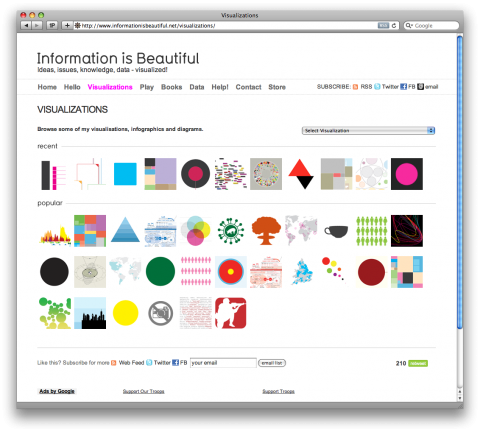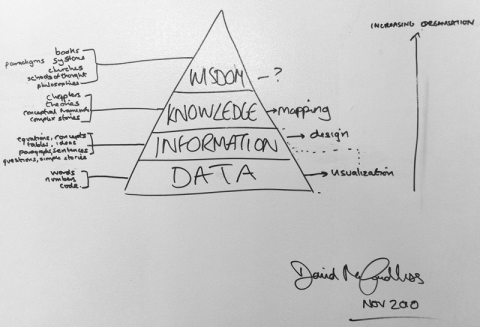Today, I am finally starting the long overdue “LunchGuest” category here on swissmiss. We often have interesting, smart people come visit Studiomates (our studio collective) and we’ve been talking for a while that we should simply start a digital guestbook of all the fantastic people that stop by.
Today’s studio lunchtable was more than packed: Studiomates were excited to meet and lunch with David McCandless, force behind Information Is Beautiful and this amazing TED Talk by David called The beauty of Data Visualization.
David McCandless is a London-based author, writer and designer. He’s written for The Guardian, Wired and others. These days he’s an independent data journalist and information designer. A passion of his is visualizing information – facts, data, ideas, subjects, issues, statistics, questions – all with the minimum of words. He’s interested in how designed information can help us understand the world, cut through BS and reveal the hidden connections, patterns and stories underneath. Or, failing that, it can just look cool!
More about David:
– A book of his information designs is published by HarperCollins in the US and UK in 2009.
– In the past, he has worked as a journalist, video games writer, satirist, copywriter, and creative director. His personal site.
– Check out his Google Shared Items scrapbook (Be warned: it’s mostly funny viral chaff and bizarro pictures)
Here’s David McCandless virtual Guestbook entry on our studio-ideapaint wall (link to view large)
It was great to have you, David!


That’s great! I am a big fan of McCandless’ work and am in full belief that information design is the way of the future (creative capital) and should have a place in education systems. How great would it be if high schoolers could, instead of Algebra 2 or Precalc, take “Math Information Design” as a class. I think McCandless’ work is evidence that there is utility in promoting design for non-designers.
Nov 9th, 2010 / 2:14 pm
This is a useful model that can be stretched by adding at least one additional level near the top: Insights reside in the space between knowledge and wisdom.
For this purpose, let’s define insights as the ability to reason from current knowledge to generate additional knowledge, to connect beyond the current experience. Insights may be glimmers of wisdom, but one can have insights without being fully wise.
Putting the example to use, Columbus had insights about geography that enabled him to uncover (or recover prior) knowledge about the shape of the Earth, yet an expected circumference of 8,000 miles so limited his globe that he mistook the New World for a slice of Asia.
Dec 5th, 2010 / 12:52 am
Great ideas keep resurfacing.
Th looks very like the pyramid drawn by the late great Russell Ackhoff – one of the founders of Systems Thinking – he had five levels:
1. Data
2. Information
3. Knowledge
4. Understanding
5. Wisdom
There is a video of him describing this at http://www.threewinsacademy.com
Keep up the good work!
Dec 14th, 2010 / 4:30 pm